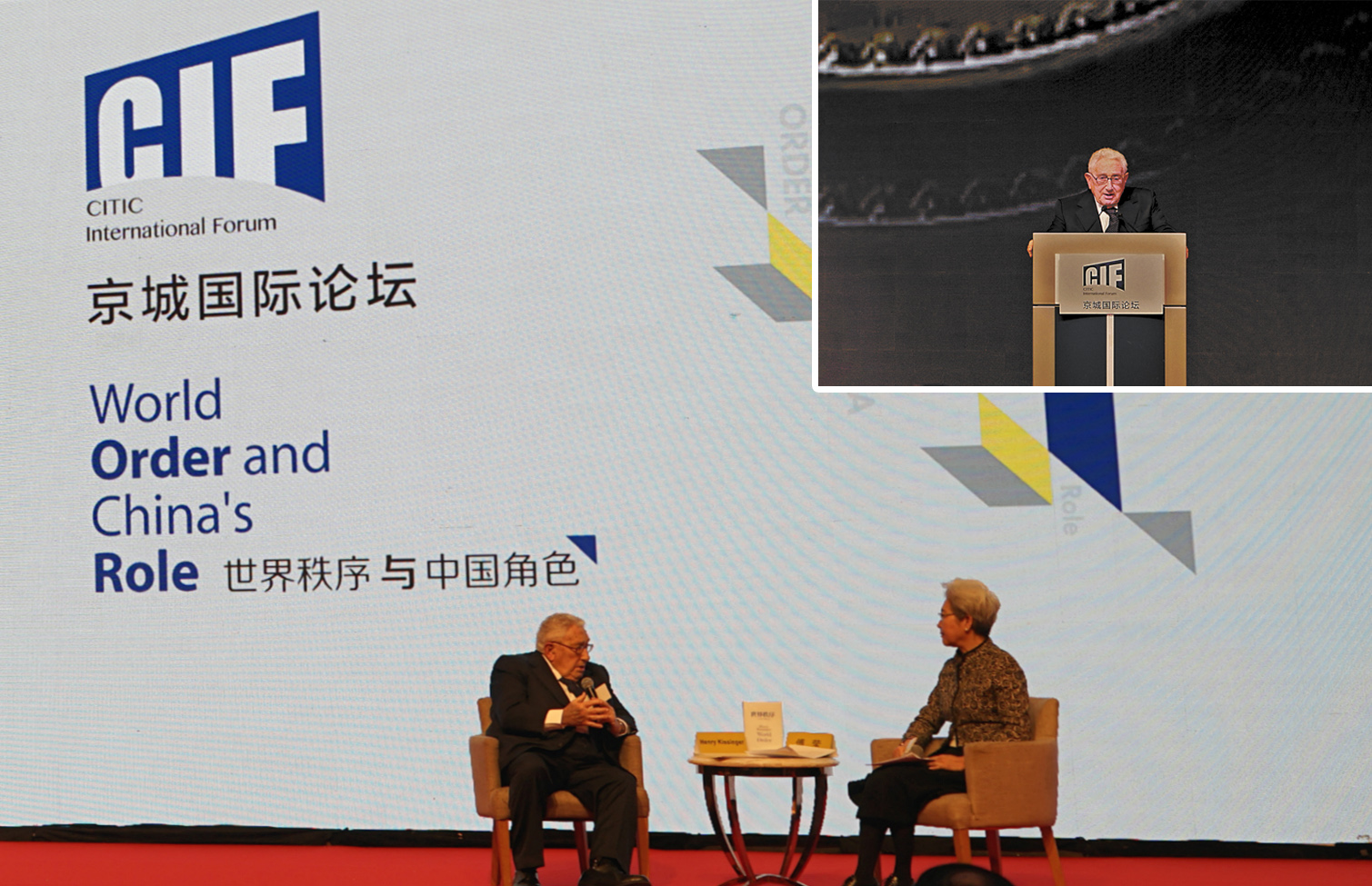Kissinger: China, US ties essential to world order

On Oct. 31, former US Secretary of State Henry Kissinger speaks with Fu Ying, chairwoman of the Foreign Affairs Committee of the 12th National People's Congress, at an international forum in Beijing, during which he delivers a speech themed “World Order and China’s Role.”
On Oct. 31, former US Secretary of State Henry Kissinger gave a lecture on “World Order and China’s Role” at an international forum in Beijing. At the age of 93, Kissinger is a living witness to the drastic changes that took place in China during 45 years of diplomatic interactions with the nation.
Kissinger said the first period started when Mao Zedong led the country to achieve independence and unification, which was followed by a period of reform as China entered the international system. He said it was amazing to see that China has become the second-largest economy considering that Honduras had more trade with the US than China nearly four decades ago. Now the Chinese government is striving for the two centennial goals—building a moderately prosperous society in all respects by 2021 and turning China into a modern socialist country by 2049. Kissinger expressed his confidence that the nation can achieve the two goals.
From adversaries to partners
“But China will also not be strong enough to dominate the world nor does it want to do so," Kissinger said. He praised the Chinese idea that potential adversaries can become partners. “There are not so many such examples in history. Therefore, this generation has the unique task of bringing this about."
“There has to be an established international order, the minimum condition of which will be that no country that participates in it will be so dissatisfied that they prefer to use force rather than peaceful settlement,” said Kissinger, calling for all countries to shoulder the common task of addressing such issues as climate change, cybercrime and the threat of nuclear weapons.
‘Two pillars’
“When China is defending its own interests, the US says it is threatened. How can we align our interests and tackle challenges together?” asked Fu Ying, chairwoman of the Foreign Affairs Committee of the 12th National People's Congress. Kissinger answered that every country thinks about its own interests, but negotiation should prevail over military force when dealing with differences.
Fu agreed with Kissinger, saying security is an issue of common interest, and one cannot seek absolute security at the expense of the security of others.
Kissinger talked about the significance of cooperation between China and the US in building a world order for the future. He went on to elaborate the differences of history and culture between the two nations. "Throughout most of history, America has never had a powerful neighbor, whereas China has never been without powerful neighbors," he said.
In addition, China and the US also have different thinking patterns, he said. Americans tend to believe that every problem has a solution and focus attention on short-term issues. "But the Chinese know that no problem has a final solution, and every solution may cause other problems," Kissinger said,explaining that Chinese people tend to think in more conceptual terms.
Faced with so many differences, Kissinger said, “It is not always so easy to bridge the gap.” However, he pointed out the key is a dynamic “adversary to partner” relationship and a cooperative partnership.
The US should treat and respect China as an equal partner, Kissinger said. In his new book World Order, he points out that the US and China are indispensable pillars of world order, and the new model of major power relations is the only way to avoid repeating historical tragedies.
Kissinger’s interpretation of China-US relations was echoed by other scholars and experts at the forum. Wu Jianmin, a member of the Foreign Policy Advisory Committee of the Ministry of Foreign Affairs, said the proposition of “two pillars” indicates that cooperation rather than confrontation between the two nations is what the future’s world order will be like.
Contribution of China
Within the context of an emerging new world order, China has unveiled a series of international cooperation initiatives to promote the Chinese ideas of cooperation, mutual benefit and opposition to a zero-sum mentality.
Kissinger said, China’s “the Belt and Road” initiative is a far-sighted platform for cooperation that many countries can participate in but no country can dominate. Zhang Xingang, former president of City University of Hong Kong, said the initiative is like a concerto, which should be played together by all participants. The Chinese decision makers have offered a peaceful, optimal path to connect sea and land routes for economic and cultural exchanges between Europe and Asia, Zhang said.
“China is increasing the openness of its economic system to drive the reform of the world order,” said Ding Zhijie, a professor from the School of Banking and Finance at the University of International Business and Economics. Greater international involvement on China’s part is conducive to constructing a fairer world order, Ding said, giving an example that the World Bank and Asian Development Bank have increased investment in developing countries due to competition from the China-proposed Asian Infrastructure Investment Bank.
Mao Li is a reporter at the Chinese Social Sciences Today.

 PRINT
PRINT CLOSE
CLOSE